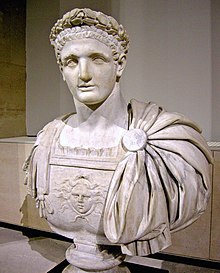Domitian
| Domitian | |||||
|---|---|---|---|---|---|

Bust of Domitian, in the Musée du Louvre, Paris
|
|||||
| 11th Emperor of the Roman Empire | |||||
| Reign | 14 September 81 – 18 September 96 |
||||
| Predecessor | Titus, brother | ||||
| Successor | Nerva | ||||
| Born |
24 October 51 Rome |
||||
| Died | 18 September 96 (aged 44) Rome |
||||
| Burial | Rome | ||||
| Wife |
|
||||
| Issue | son (80–83) | ||||
|
|||||
| Dynasty | Flavian | ||||
| Father | Vespasian | ||||
| Mother | Domitilla | ||||
| Full name | |
|---|---|
| Titus Flavius Domitianus (from birth to 69); Titus Flavius Caesar Domitianus (from 69 to accession); Titus Flavius Caesar Domitianus Augustus (as emperor); Imperator Caesar Domitianus Augustus Germanicus (imperial name) |
| Roman imperial dynasties | |||
| Flavian dynasty | |||
| Chronology | |||
| Vespasian | 69 AD – 79 AD | ||
| Titus | 79 AD – 81 AD | ||
| Domitian | 81 AD – 96 AD | ||
| Family | |||
|
Gens Flavia Category:Flavian dynasty |
|||
| Succession | |||
|
Preceded by Year of the Four Emperors |
Followed by Nerva–Antonine dynasty |
||
Domitian (/dəˈmɪʃən, -iən/; Latin: Titus Flavius Caesar Domitianus Augustus; 24 October 51 – 18 September 96) was Roman emperor from 81 to 96. Domitian was the third and last emperor of the Flavian dynasty.
Domitian's youth and early career were largely spent in the shadow of his brother Titus, who gained military renown during the First Jewish–Roman War. This situation continued under the rule of his father, Vespasian, who became emperor in 69 following the civil war known as the Year of the Four Emperors. While Titus held a great many offices under the rule of his father, Domitian was left with honours, but no responsibilities. Vespasian died in 79 and was succeeded by Titus, whose own reign came to an unexpected end when he was struck by a fatal illness in 81. The following day Domitian was declared emperor by the Praetorian Guard, commencing a reign that lasted fifteen years – longer than any man who had ruled since Tiberius.
As emperor, Domitian strengthened the economy by revaluing the Roman coinage, expanded the border defenses of the empire, and initiated a massive building program to restore the damaged city of Rome. Significant wars were fought in Britain, where his general Agricola attempted to conquer Caledonia (Scotland), and in Dacia, where Domitian was unable to procure a decisive victory against king Decebalus. Domitian's government exhibited totalitarian characteristics; he saw himself as the new Augustus, an enlightened despot destined to guide the Roman Empire into a new era of brilliance. Religious, military, and cultural propaganda fostered a cult of personality, and by nominating himself perpetual censor, he sought to control public and private morals. As a consequence, Domitian was popular with the people and army, but considered a tyrant by members of the Roman Senate.
...
Wikipedia
